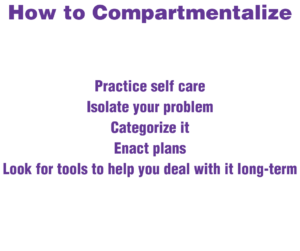Journalists write and record the words of men like Elon Musk, Warren Buffet, and Bill Gates like they’re precious bits of gold tumbling from the mouths of living oracles.
There’s some sense to it. These men are visionary and forward-thinking. Listening to them, you can feel that the future can be developed into this wonderful place if you strategize just right and if the people in power do what they say.

Yet, for others, the present is this hellish place. It’s not a planet of exciting innovation. It’s a heart-rending grind. It’s a disaster for both personal and public reasons. It’s a different reality. Law enforcement, emergency medical personnel, and counselors deal with this reality. They keep society functioning. They provide resilience.
As with many other important characteristics, their abilities are undervalued and in the background.
If Musk, Buffet, Gates, and their type are playing offense, these others are playing defense.
As in sports, if society is to “win” both defense and offense have to be competent.
Journalists are only interested in the defense when there’s a big, dramatic tragedy. How are we as a society going to cope, they ask? Even then, they focus on the spokespeople and department heads and people with a lot of degrees (who have theoretical experience, not necessarily in the field actually confronting problems). They also look to Musk, Buffet, and Gates again for comment in those situations too, just out of habit.
The men and women on the front lines are too busy.
Among the jobs on the defense, two of the most mentally and emotionally tough jobs out there are a working counselor and social worker.
Really, how tough does someone have to be not to be overwhelmed by a diet of daily hopelessness punctuated by periods of loss and despair?
Imagine talking with person after person wanting to kill themselves; a job where you’re rarely rewarded for doing a good job and scrutinized heavily if something goes wrong. Your clients are mired in hopelessness, steeped in the worse behavior of humanity. All-day long. Every single workday.
Then you get the occasional mass tragedy like a school shooting, or natural disaster. You help others deal with that too.
Granite wears down under the continual assault of the elements. Yet the counselor and social worker can’t be figurative stones. To be effective, to do the job, they’ve got to be empathic. They’ve got to reach out to do their best to understand their clients to be understood.
“You only do this for the money!”
In dramatic movies from the 1930s and 40s, you have people smacking others in the mouth when they say something off base. They smack each other in the mouth for saying off-base things so much that it’s something of a cliché. I’ve got it on good word people didn’t actually do this in real life. It was a screenwriter’s trick to punctuate a dramatic line.
Once, in an emergency department in rural west Texas, I heard a bitter person accuse a counselor of only working their job for the money. This was after the counselor got out of a warm bed to drive 80 miles to come to their bedside at 2 a.m.
If anyone deserved “the old Hollywood movie treatment,” that client did. The man had built an incredible wall of hopelessness, despair, and hate! With their counselor’s advanced understanding of psychology, he did not appreciate how much money the counselor could have made as a salesman with his skill set, for example. Or even working in the oil fields north of the town, where a roughneck with a high school diploma could make more than twice the counselor’s wage.
The counselor plainly was the type who sought intangible satisfaction. It’s not a stretch to say he could have easily made three times what he did as a counselor doing another job.
How do the top counselors and social workers do it? How could he let all those stresses slide off his back, do good, enjoy the challenge, and enjoy life?
It starts with a giving nature that’s enabled by compartmentalization. Compartmentalization is the key.
What healthy compartmentalization is and isn’t
Healthy compartmentalization is a way to deal with upsetting thoughts and feelings at the right time.
When is the right time?
The right time is when you can do something about them. You can understand them when you can actually fix the problem when you’re not too tired. That time.
Unhealthy compartmentalization is when you suppress these thoughts. When you do that, the thoughts and feelings will come up at inopportune times. When they do this, they’re more likely to spiral out of control.
If people weren’t able to compartmentalize, people wouldn’t be counselors, police officers, or serve in the military.
It’s a necessary psychological defense mechanism. It allows you to surmount problems.
Of course, you can have experiences that surmount your ability to deal with them. Compartmentalization, however, increases your resilience.
How to compartmentalize
First, you want to build your life in a way that makes it more likely you will healthily compartmentalize problems.
Be diligent about self-care basics—sleep enough. Get a proper amount of physical activity and exercise. Have interests and hobbies. Be passionate about life! Cultivate the habit of looking for the positives in a situation and counting your blessings.
Actively try not to be self-centered. Pray for others who aren’t being prayed for. Look for ways to help others.
Having a disposition like that will mentally pull you away from despair.
When facing a problem, try to isolate it from other problems while understanding how it’s interrelated.
For example, if you’re feeling down about your weight, understand how it might be interrelated to your habit of having ice cream for dessert every day and taking three creamers and three sugars in your coffee. Don’t focus so much on feeling hopeless. Be proactive.
Another mechanism that seems to aid one in compartmentalization is mental categorization. Counselors and social workers seem to approach situations as “is this the worst I’ve seen?” Yes, this situation might be bad, but they’re not impressed unless it’s the worse they’ve seen or unless the situation is a contender for the title.
Concentrate on the compartments ideally one at a time. Don’t dwell on them. You can allow yourself to do this in bed as long as you don’t let them keep you up. Let go and let God. Realize when some problems are truly out of your control (as they say, “above your pay grade”). Come up with actionable plans.
Enact plans. When you see progress or success, decide whether to let the compartment go, when you can, figuratively crush what’s in the compartment and throw it away. Break the egg.
Finally, know when something doesn’t deserve a compartment. If it’s stupid, not important to your life or goals, forget about it.
Consider using your dream journal or other paper to organize your thoughts or these compartments. These areas of your life can come out in your dreams. If you find yourself in a complex situation with many competing priorities, you might want to consider journaling strongly. Life can sometimes be somewhat of a juggling act.
Another thing that can help compartmentalize is software that addresses certain common problems. For example, budgeting software like YNAB can help you navigate a complicated financial picture. Using scheduling software like Outlook and developing the habit of looking at it in the morning can help you manage it.
Awareness of your problems and addressing them can help you in many ways. You can avoid trouble. You can get business ideas. You can feel better about yourself.
Getting enough sleep isn’t the only benefit. Ultimately, you can live better.
Further reading:
How to compartmentalize your thoughts and emotions
Are you disconnecting or compartmentalizing?
Also on the blog:
James Cobb RN, MSN, is an emergency department nurse and the founder of the Dream Recovery System. His goal is to provide his readers with simple, actionable ways to improve their health and maximize their quality of life.
This post includes affiliate links for which we receive a small commission.
